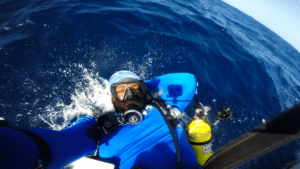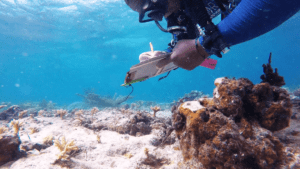
The Center for Marine and Environmental Studies (CMES) at the University of the Virgin Islands (UVI) has prepared 14 students to be marine and environmental scientists. They will all receive a Master of Marine and Environmental Science (MMES) degree on Thursday, May 17.
“Given that we have had approximately 50 graduates in the first decade of the MMES program, for us to see 14 finish in a year after such devastation is remarkable. This accomplishment speaks to the perseverance of the MMES and CSM faculty who guided these new scientists towards completing their degree requirements while working without offices and lab space.
“As for the graduating students, kudos to them as well, and I’m particularly excited to see such relevant research emerge from their theses that can help inform territorial resource managers and scientists alike,” said Dr. Kim Waddell, director of VI-EPSCoR (www.viepscor.org)
To illustrate the range and complexity of the students’ research topics and the relevance to the territory, the student abstracts are listed below. It is notable that much of the work relies on VI-EPSCoR-sponsored acoustic tracking technology, and it is centered within Brewers Bay. Therefore, the work draws from, and adds to, the wealth of information gathered within the Brewers Bay Ecosystem Analysis Project (https://viepscor.com/brewers-bay/).

One consistent theme of the students’ work is their interest in studying the relationship of marine organisms with their environment, such as their habitat and food preferences. The use of new technology provides these new researchers unique insights into the behavior of these species that are otherwise virtually impossible to track in the sea. The research findings are particularly important as scientists work to understand the effects of a changing environment on these important marine species.
VI-EPSCoR’s investment in the acoustic tracking arrays within Brewers Bay is being used to support and inform the research. Acoustic telemetry uses tags surgically implanted into or onto marine animals. These tags emit unique pings every minute. The pings deliver information to strategically placed hydrophones or receivers that record the animal’s identification code, date and time.
Scientists turn this information into maps of the animal’s movements over weeks and months. Atlantic tarpon, lane and mutton snapper, and green and Hawksbill sea turtles are some of the species tagged and tracked using this technology.

Climate change and environmental disruptions, in the form of marine debris, watershed runoff and coral diseases, are also areas of focus. CMES sees these as issues that affect the territory as a whole, and it will help support the work of marine researchers and environmental decision makers.
Quote:
“The UVI Class of 2018 has endured many challenges the past nine months. I believe we are among a short list of institutions to ever experience two natural disasters during a two-week period. During the aftermath of the storms, these scholars increased their engagement through research and voluntarism to assist with our recovery. As these graduates seek new challenges and research opportunities, we are confident their experience at UVI prepared them for any challenge they may encounter in the future. These scholars are not just graduates of our marine science program, they are our Ambassadors of Excellence,” said Mitchell A. Neaves, vice president of Institutional Advancement, University of the Virgin Islands
Summary of Theses and Graduates
John Cassell: Seasonal Patterns of Seagrass Species with Relations to Herbivore Preference in a Small Caribbean Bay
Michele Donihe: Assessing Impacts of the Invasive Seagrass, Halophila stipulacea, on Juvenile Southern Stingray (Hypanus americanus) Habitat Preference and Delineation of Diel Movement Patters in Brewers Bay and Perseverance Bay, St. Thomas, USVI.
Mareike Duffing Romero: Spatial-temporal movement patterns of Atlantic tarpon (Megalops atlanticus) and lane snapper (Lutjanus synagris) in the U.S. Virgin Islands.
Kari Gerkhe: Home range and habitat use of juvenile green sea turtles (Chelonia mydas) in Brewers Bay, St. Thomas
Sarah Heidmann: Diel patterns in movements of mutton snapper, Lutjanus analis, within home ranges and on spawning grounds in the U.S. Virgin Islands
Paul Hillbrand: Reconstructing Male Hawksbill (E. imbricata) Genotypes in the Nesting Population of Buck Island Reef National Monument, St. Croix: An Assessment of Multiple Paternity and the Breeding Sex Ratio.
Colin Howe: The acclimatization of the Caribbean fused stag horn coral Acropora prolpifera to non-natal locations.
Amelie Jensen: Predictors of and variability in seagrass sediment blue carbon from St. Thomas, U.S. Virgin Islands
Lora Johansen: Factors Influencing Activity Space of Juvenile Hawksbill Sea Turtles
Danielle Lasseigne: Microplastic abundance influenced by anthropogenic activity in St. Thomas, USVI.
Sam Mitchell: The recovery of Seagrass and Chelonia mydas (green sea turtle) after Hurricane Earl in 2010 in Brewers Bay, St. Thomas
Moriah Sevier: Identifying pathogen sources and vectors: A spatiotemporal ridge-to-reef valuation of a Gorgoinia ventalina aspergillosis epizootic in St. Thomas, U.S.V.I.
Sara Thomas: Age, Growth and Reproduction of the Queen Triggerfish, Batistes vetula, from the U.S. Virgin Islands
Nikita Thompson: Evaluating the abundance and size distribution of Indo-Pacific lionfish (Pterois spp.) in the U.S. Virgin Islands





